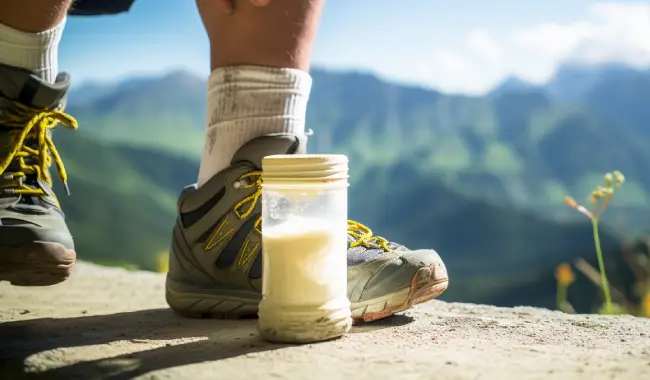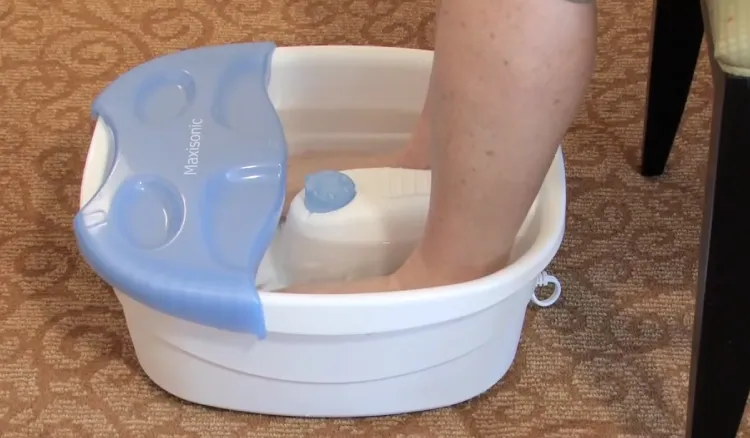Coffee is known for its comforting aroma and energizing effects, a delightful companion on many occasions. But can you enjoy that cup of coffee without repercussions while dealing with plantar fasciitis during your invigorating hiking escapades?
While coffee has energizing effects during hiking, you should avoid taking it if you have plantar fasciitis. Coffee contains compounds that can worsen inflammation and amplify pain sensitivity, both of which are closely intertwined with plantar fasciitis.
The strain on your feet during hiking, combined with coffee’s potential to aggravate these symptoms, can lead to prolonged discomfort and hinder healing.
We will discuss which foods you should stay away from while hiking to manage plantar fasciitis and what foods aid in healing plantar fasciitis while hiking.
How Does Coffee Affect Plantar Fasciitis Caused by Hiking?

When managing plantar fasciitis, you need to be aware of certain factors that can worsen your symptoms.
- Inflammation Aggravation
- Pain Perception Amplification
- Sleep Disruption
Let’s explore how coffee consumption affects plantar fasciitis following a hike in detail.
Inflammation Aggravation
Drinking coffee can exacerbate inflammation, potentially prolonging the recovery process for strained and inflamed plantar fascia after a challenging hike.
When you consume coffee, compounds like caffeine enter your bloodstream and promote inflammation, including your feet. This inflammation can aggravate the already strained plantar fascia, making the road to recovery more difficult.
Pain Perception Amplification
The caffeine in coffee can affect pain perception. It stimulates your nervous system, potentially heightening your pain sensitivity.
When you have plantar fasciitis, a condition characterized by inflammation of the tissue on the bottom of your foot, any added pain can be unbearable. Studies have shown that caffeine stimulates the nervous system, heightening pain sensitivity.
Sleep Disruption
Coffee’s stimulating effects can interfere with your ability to get a good night’s sleep, which is crucial for healing and recovery.
When you don’t get enough sleep, your body’s inflammation levels can worsen, making it harder for your plantar fasciitis symptoms to improve.
Here are five ways caffeine can disrupt your sleep and hinder your recovery process:
- Caffeine can delay sleep onset, making it harder for you to fall asleep after a long day of hiking.
- It can decrease the total amount of sleep you get, leaving you feeling tired and less able to recover.
- Caffeine can disrupt the quality of your sleep, causing you to wake up frequently throughout the night.
- It can increase the time it takes for you to reach deep, restorative sleep, which is essential for repairing damaged tissues.
- Caffeine can also interfere with your body’s natural sleep-wake cycle, throwing off your circadian rhythm and making it harder for you to establish a healthy sleep routine.
Which Foods Should You Avoid While Hiking to Manage Plantar Fasciitis Besides Coffee?
When managing plantar fasciitis while hiking, you must be mindful of the foods you consume. Here are some foods you should avoid while hiking with plantar fasciitis, including coffee.
Sugary Snacks
You should definitely skip those sugary snacks if you want to prevent inflammation and avoid worsening your plantar fasciitis symptoms while hiking.
Consuming candy, pastries, or sugary energy bars might seem tempting, but the inflammation they cause can worsen the pain in your feet.
Processed Foods
Processed foods are often loaded with unhealthy fats and additives that have been linked to inflammation.
Snacks like packaged chips and fast food options might be convenient when you’re hiking, but it’s best to steer clear of them.
Processed foods like these are also generally low in fiber, contributing to constipation, worsening inflammation, and aggravating plantar fasciitis symptoms.
White Bread and Pastries
Foods high in refined flour, like white bread and pastries, are also a no-go when managing plantar fasciitis.
These foods are high in carbs and can cause a spike in your blood sugar levels, leading to inflammation and worsening of your symptoms.
They are also low in nutrients like fiber and vitamins essential for maintaining overall health. So, bid farewell to white bread and pastries and shift towards whole-grain bread and other healthier options.
Sodas and Sweetened Beverages
Sodas and other sweetened sports drinks may be tempting while hiking, but they should be avoided at all costs.
These drinks are loaded with sugar, which is bad for your overall health and can also worsen your plantar fasciitis symptoms.
Sugar in drinks, similar to those in sugary snacks, increases inflammation in the body. Also, sugary drinks are high in calories and provide no nutritional value. So, make sure to drink plenty of water instead and avoid sweetened beverages altogether.
What Foods Aid Plantar Fasciitis Healing While Hiking?

Certain foods can benefit you in aiding the healing process of plantar fasciitis while hiking. The following are among them:
Anti-inflammatory Fruits
Bring along some antioxidant-rich fruits, like blueberries and strawberries, to help reduce inflammation while hiking with plantar fasciitis.
These fruits contain compounds called anthocyanins, which have been shown to have anti-inflammatory effects on the body.
When you consume these berries, the antioxidants help to neutralize harmful free radicals, which can contribute to inflammation.
As you hike, imagine the burst of flavor as you bite into a juicy, ripe blueberry. Picture the vibrant red color of a perfectly ripe strawberry, its sweetness balancing out the tartness.
Lean Proteins
Lean proteins are essential for muscle repair and healing, making them a crucial part of your hiking journey. Turkey slices and grilled chicken are excellent sources of lean protein that you can easily pack and bring along on your hike.
These protein-rich foods provide the necessary building blocks for repairing and strengthening the muscles in your feet and legs, helping to prevent further damage and reduce pain.
Nuts and Seeds
Incorporating nuts and seeds into your diet can provide healthy fats and nutrients that support overall foot health. Here are five reasons why you should consider adding them to your meals:
- Nuts like almonds are rich in vitamin E, which can help reduce foot pain and inflammation.
- Flaxseeds are packed with omega-3 fatty acids, which have been shown to improve joint health and reduce the risk of foot problems.
- Pumpkin seeds are a great source of magnesium, a mineral that plays a crucial role in muscle and nerve function, helping to prevent foot cramps.
- Chia seeds are high in fiber, promoting healthy digestion and preventing weight gain, which can put extra pressure on your feet.
- Walnuts contain antioxidants that can help protect your feet from damage caused by free radicals.
Whole Grains
Opt for whole grains like whole wheat bread or quinoa as a fuel source for carbohydrates. Whole grains are an excellent choice for hikers because they provide sustained energy and are packed with essential nutrients.
Unlike refined grains, which have been stripped of their fiber and nutrients, whole grains contain the entire grain kernel, including the bran, germ, and endosperm. This means they are rich in fiber, vitamins, and minerals.
Whole grains’ fiber helps regulate blood sugar levels, keeping you energized throughout your hike and relieving plantar fasciitis. Also, whole grains are a good source of B vitamins, which are important for energy metabolism.
Leafy Greens
Add leafy greens like spinach or kale to your hiking meals to boost your nutrient intake and reduce plantar fasciitis inflammation. These vibrant, nutrient-packed greens provide many health benefits that can enhance your hiking experience.
Here are five reasons why leafy greens are a must-have for your hiking adventures:
- Rich in vitamins and minerals: Leafy greens are packed with essential nutrients like vitamin C, vitamin K, folate, and iron, which are vital for maintaining optimal health and energy levels during your hike.
- Hydrating properties: Leafy greens have a high water content, helping to keep you hydrated and replenished while trekking through the trails.
- Anti-inflammatory effects: The anti-inflammatory properties of leafy greens can help alleviate any discomfort or pain associated with hiking, such as joint inflammation or muscle soreness.
- Antioxidant powerhouses: These greens are rich in antioxidants, which can help protect your body against oxidative stress caused by strenuous physical activity.
- Digestive health support: The fiber content in leafy greens promotes healthy digestion and can prevent any digestive issues that may arise during your hike.
Incorporating leafy greens into your hiking meals is an easy and delicious way to support your overall health and enhance your hiking experience.
Omega-3 Rich Foods
Consider bringing along snacks like trail mix with walnuts or almonds to benefit from the anti-inflammatory effects of omega-3 fatty acids.
Omega-3 fatty acids are essential fats that have been shown to have numerous health benefits. They have anti-inflammatory properties, which can help reduce inflammation in the body, including inflammation associated with conditions like plantar fasciitis. Omega-3 fatty acids may help alleviate symptoms of plantar fasciitis and promote healing.
Salmon is an excellent source of omega-3s, providing around 1.5 grams per 100 grams of fish. Chia seeds are also great, offering about 5 grams of omega-3s per ounce.
Can increased water intake contribute to managing plantar fasciitis during hiking?
Increasing your water intake can contribute to managing plantar fasciitis during hiking. Proper hydration supports the body’s natural processes, including reducing inflammation and promoting healing.
By drinking enough water during your hiking sessions, you provide your body with the necessary hydration to alleviate inflammation and ease discomfort associated with plantar fasciitis.
Additionally, maintaining proper hydration supports overall well-being and foot health while enjoying outdoor adventures.
Can collagen powder help manage plantar fasciitis symptoms during a long hiking trip?

Collagen powder has the potential to help relieve plantar fasciitis symptoms during a long hiking trip. This is due to the fact that collagen, a vital protein, supports connective tissues like the plantar fascia.
By including collagen powder in your diet, you may supply your body with the necessary building blocks to maintain the health and resilience of your fascia.
This in turn can lead to reduced discomfort and improved foot support during the rigorous physical activity of hiking.
But, make sure to consult with a healthcare professional before adding any dietary supplements, such as collagen powder, to your routine to ensure that it is appropriate for your particular situation and needs.
Navigate the Hiking Trails with the Power of Nutrition
You now understand the intricate relationship between coffee consumption, plantar fasciitis, and hiking. Although that cup of coffee might give you a boost, it can exacerbate inflammation and amplify pain sensitivity, especially if you have plantar fasciitis.
By avoiding inflammatory foods like sugary snacks, processed foods, and sweetened beverages, you can better manage plantar fasciitis symptoms while hiking.
On the other hand, incorporating anti-inflammatory foods like antioxidant-rich fruits, lean proteins, nuts, seeds, whole grains, leafy greens, and omega-3-rich foods can aid in healing and alleviate discomfort.
Prioritize nutrition, hydration, and informed decisions to ensure that your hiking journey remains an enjoyable and fulfilling one.



Leave a Reply